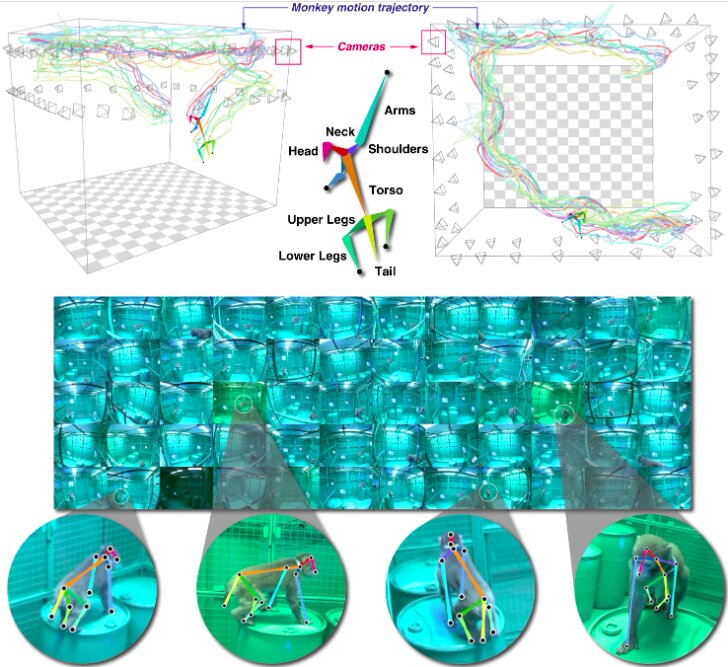To gain a better understanding of human behavior and cognition, as well as their neural underpinnings, researchers often study other mammals with similar characteristics. One of the most common species examined in these studies is the rhesus macaque, a type of old-world monkey native to South, Central and Southeast Asia.
Rhesus macaques have served as an animal model for countless neuroscience, psychology medicine and ethology studies, as they are known to share a number of behavioral patterns and biological characteristics with humans. For instance, they have proved useful for studying infections, strokes, AIDS and other health conditions.
Researchers at University of Minnesota have recently developed OpenMonkeyStudio, a deep-learning-based motion capture system that can be used to study the behavior of freely moving macaques. This system, presented in a paper published in Nature Communications, can estimate the poses of freely moving macaques in 3-D, which could be particularly valuable for investigating how the animals interact with each other and with their surrounding environment. In this context, the term ‘pose’ refers to a representation of how an animal’s major body parts are positioned, both in relation to each other and to the environment around them.
“Pose estimation can currently be done with a high degree of accuracy by commercial marker-based motion capture systems (e.g., Vicon, OptiTrack, and PhaseSpace),” the researchers explain in their paper. “Macaques, however, are particularly ill-suited for these marker-based systems.”
Most traditional capture systems that use markers are difficult to apply to macaques for a number of reasons. First, macaques have long, dense fur that makes attaching markers particularly challenging, and highly flexible skin that leads to markers shifting position as the animals move in their environment. In addition, as macaques are highly agile and curious creatures, they often try to remove markers and feel very uncomfortable if they are forced to wear bodysuits or jackets.
Researchers have thus been trying to devise motion capture systems that do not rely on markers that can efficiently track the movements of macaques. While deep-learning-based techniques for estimating human poses in images could be a viable solution, they often require a vast amount of training data to perform well, which sometimes needs to be manually annotated, as well.
OpenMonkeyStudio, the markerless system for 3-D-pose estimation developed by the team at the University of Minnesota, was trained using a fully supervised learning approach. In contrast with previously proposed deep-learning techniques for tracking the movements of macaques, however, this system did not need to be trained on vast amounts of existing manually annotated datasets.
“Our system uses 62 cameras, which provide multiview image streams that can augment annotated data to a remarkable extent by leveraging 3-D multiview geometry,” the researchers write in their paper. “While this large number of cameras is critical for training the pose detector, the resulting model can be used in other systems (for example by other laboratories) with fewer cameras, without training.”
The researchers evaluated OpenMonkeyStudio in a series of experiments involving four male rhesus macaques. In these tests, their system achieved remarkable accuracy, outperforming some of the best marker-based motion capture systems on the market today (i.e., OptiTrack, NaturalPoint, Corvallis and OR). Moreover, OpenMonkeyStudio was found to generalize well across different macaques and can also track the movements of two subjects simultaneously.
In addition to developing a motion capture system that can facilitate studies investigating the behavior of macaques, the researchers compiled a new dataset containing 195,228 annotated images, called OpenMonkeyPose. In the future, this dataset (which is available on on GitHub) could be used to train alternative deep learning-based systems for tracking the movements of rhesus macaques.
Experiments suggest macaques are capable of making decisions based on inference
More information:
Automated markerless pose estimation in freely moving macaques with OpenMonkeyStudio. Nature Communications(2020). DOI: 10.1038/s41467-020-18441-5.
2020 Science X Network
Citation:
OpenMonkeyStudio: A deep-learning-based system to estimate 3-D poses of freely moving macaques (2020, October 19)
retrieved 19 October 2020
from https://techxplore.com/news/2020-10-openmonkeystudio-deep-learning-based-d-poses-freely.html
This document is subject to copyright. Apart from any fair dealing for the purpose of private study or research, no
part may be reproduced without the written permission. The content is provided for information purposes only.



